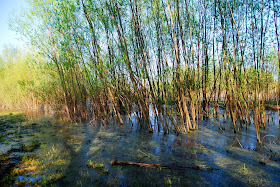By word of explanation; Polskie Linie Kolejowe (PLK) is the state-owned company responsible for the rail infrastructure in this country. The erstwhile monopolist Polskie Koleje Państwowe (PKP) has been split into various companies including PLK and train operators such as InterCity, Przewozy Regionalne, PKP Cargo and regional operators owned by individual provinces.
PLK, flush with EU structural funds, is engaged on a strategic programme of modernising Poland's railways (as I've pointed out, on many lines, scheduled journey times are longer than in pre-war, steam-hauled days). The EU needs Poland's railways to be fast - a country placed at the heart of the continent should not be a transport bottleneck. So things are happening - slowly.
Back to Jeziorki and neighbourhood. The line between Warsaw and Radom will be improved so that trains can travel at 160km/h (100mph). Currently, the line is theoretically good for 100-110km/h, though there are many speed restrictions in force due to the poor state of the track (as a quick look at the rotting wooden sleepers between Dawidy and Jeziorki will atest).
To allow trains to travel at higher speeds, the line needs the kinks ironed out of it. In particular the way the up line (northbound) bows round the island platforms that are a feature of the stations between Okęcie and Nowa Iwiczna.
Removing island platforms will be made difficult because of the coal line running parallel to the main line. So the solution proposed in the project documentation (relevant fragment below*) is to move the down platform (southbound) at W-wa Jeziorki across to the other side of ul. Karczunkowska, to the right of the line. The same solution is planned for Nowa Iwiczna station. (Click for enlargement)
 Most radically for inhabitants of Jeziorki, a viaduct will be built over the railway line, replacing the current level crossing. The documentation is unclear as to whether a viaduct will carry ul. Baletowa across the line at W-wa Dawidy (it shown thus above), or whether the level crossing will be upgraded to one with lights and barriers. Similarly, the situation at Nowa Iwiczna station is unclear.
Most radically for inhabitants of Jeziorki, a viaduct will be built over the railway line, replacing the current level crossing. The documentation is unclear as to whether a viaduct will carry ul. Baletowa across the line at W-wa Dawidy (it shown thus above), or whether the level crossing will be upgraded to one with lights and barriers. Similarly, the situation at Nowa Iwiczna station is unclear.The documentation for the project to modernise Line No. 8 was finalised in August 2007, the rampa na kruszywa is still shown (work to demolish it began in May 2008). Additional halts on the line at Mysiadło (between W-wa Jeziorki and Nowa Iwiczna) and at Stara Iwiczna (between Nowa Iwiczna and Piaseczno) have not been mentioned.
When will this all happen? According to the PLK website, work will start next year and be completed in 2015. My own view? Right now, the road builders have got their act together. Between them the highways authority (GDDKiA), the construction companies, the local authorities and the legislature are working better than ever before in Poland's 20 year history as a new democracy. But the old PKP 'state-within-a-state', even after being split up, is still not functioning as it should. I very much doubt that a 160km/h Warsaw to Radom line will be operational by 2015. I hope to be proved wrong.
Worth following the thread on the modernisation of Line No. 8 on the Skyscraper City forum here (in Polish).
* Diagram from Modernizacja Linii Kolejowej Nr 8 Część 5, prepared by Scetauroute/Nexel Polska





















